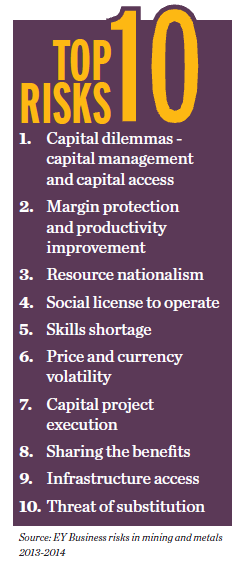While every organization has its risks to deal with, mining companies—local or international—must consider myriad risks from every angle in every location. There are the risks that any company should consider, such as return on capital, supply chain and natural catastrophes, but there are others that mining operations must also pay careful attention to, which can vary by location. These include political risks, corruption, weather and even piracy and kidnapping.
A new report by Willis, “Mining Risk Review: Spring 2014” found that a top concern for a mining operation is its capital. The mining sector continues to face low commodity prices, combined with rising operational costs and supply and demand imbalances. Here are the top 10 risks reported by mining operations:
This year is dogged by an uncertain financial future. Mining stocks fell some 30% in 2013 and there is little sign of improvement ahead. According to Willis:
Shareholders still want to see good returns, increasing the pressure still further. Those mining operations that can reduce costs from the boom-year levels and keep projects on track are likely to be the successful ones in the coming year.
Opportunity, challenge and volatility – it is all there in 2014.
The question for mining companies is how to keep track of all three in a way that supports the business. Risk analytics are playing an increasingly valuable role in this diverse operating environment.
Without risk there is no enterprise but no one likes to take risks without knowing the odds.
Mining companies also need to keep their traditional risks in mind—those that could threaten operations, the report said. One such risk is injury to employees, who are often at greater peril than employees in other industries. Contract workers and those new to the job are the most vulnerable.
The study found that:
• Mining death rates from work-related accidents were 42.9 out of 100,000 compared to police and firefighters, with 3 out of 100,000.
• 90% of mining industry fatalities in the last decade involved contract workers.
• 80% of fatalities involved a worker with five years of experience or less at a site.
Supply chain risk is relevant to most organizations, but mining companies are especially dependent on both upstream and downstream operations. According to the survey, a key risk indicated by global companies is business interruption resulting from a break in the supply chain. But few sectors have initiated lessons learned from recent disasters, such as Fukoshima in Japan, floods in Thailand and Superstorm Sandy in the U.S.
The study found that supply chain risks vary from one mining operation to another and can be tied to:
• The remoteness of the mine – which leads to a long chain of supply and increases the likelihood of parts and supplies being lost or delayed in transit.
• Reliability of economic, community, sovereign, natural and infrastructure environments – the breakdown of these infrastructures often affects mining companies.
• Key supplier dependencies – loss of a supplier for critical items can be devastating to a company, according to the study.


Hi Caroline,
This was a great article to read, Thanks.
Regards
Joseph